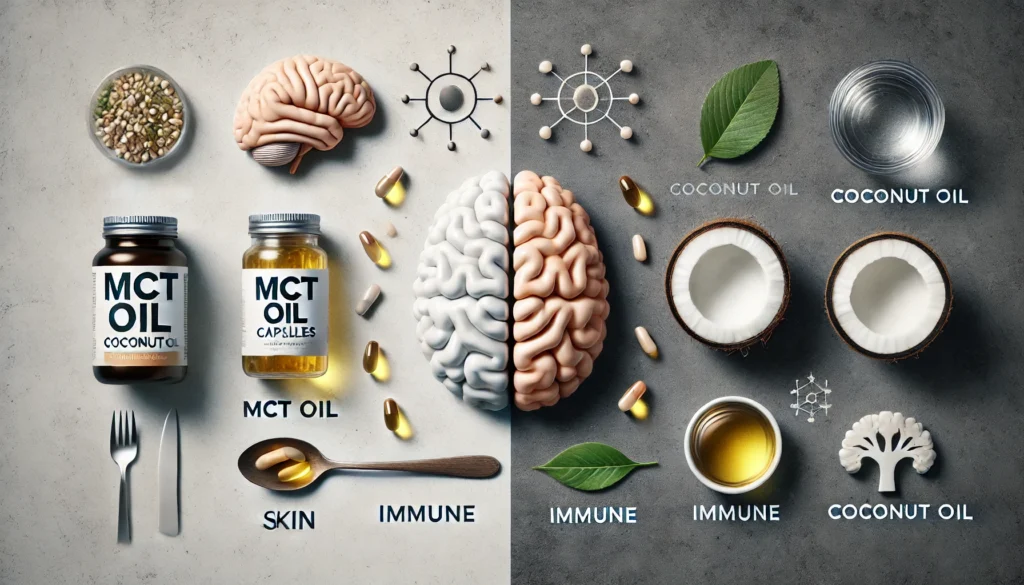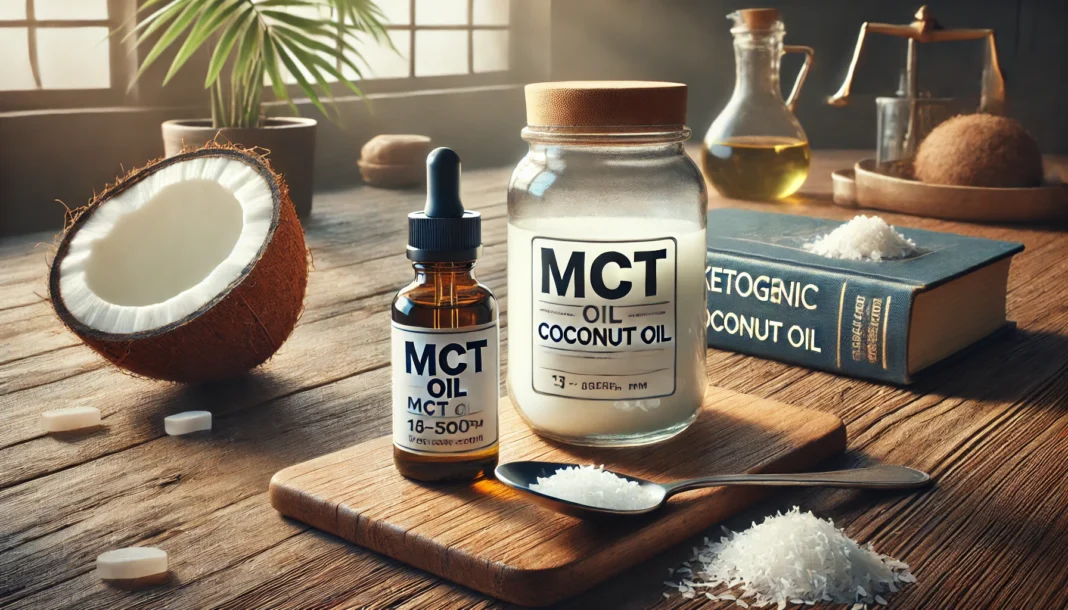Introduction
Coconut oil has long enjoyed the status of a superfood in natural health circles, with its creamy texture and rich nutritional profile offering a range of therapeutic benefits. However, in recent years, a new contender has entered the wellness spotlight—MCT oil, or medium-chain triglyceride oil, often derived from coconuts themselves. As interest in functional foods and biohacking increases, many consumers are left wondering about the actual difference between MCT oil and coconut oil, and whether one is better suited than the other for specific health outcomes. The confusion is understandable: both products come from the same plant source and share overlapping chemical profiles. Yet their physiological effects, absorption mechanisms, and applications in healthcare and nutrition are surprisingly distinct.
You may also like: MCT Oil for Dementia and Brain Health: Exploring Its Role in Memory, Function, and Alzheimer’s Support
This article explores the biochemical and clinical differences between MCT oil and coconut oil with the precision required by the science and research community. It dives into essential concerns such as “is coconut oil the same as MCT oil,” examines questions like “does coconut oil contain MCT,” and evaluates the real-world benefits and drawbacks of both. From metabolic performance to neurological protection, from skin applications to weight management, we’ll investigate how each oil behaves in the body, what the literature says about their benefits, and whether integrating either or both into your wellness routine makes sense. We’ll also examine claims about MCT oil for cancer, MCT oil and weight gain, and MCT oil benefits for hair, offering a clear, evidence-based guide that can serve both clinical professionals and health-minded individuals alike.
By the end of this in-depth exploration, you’ll understand the difference between MCT oil and coconut oil, the role of coconut oil MCT content, and how their use in coffee, skincare, or therapeutic nutrition may yield very different results depending on the context. Let’s begin by understanding the basic composition and physiological behavior of MCTs from coconut oil.

What Are MCTs from Coconut and How Are They Processed?
Medium-chain triglycerides (MCTs) are a group of saturated fats composed of 6 to 12 carbon atoms. Unlike long-chain triglycerides (LCTs), which are more common in the diet, MCTs are absorbed directly into the bloodstream via the portal vein and rapidly oxidized in the liver for energy. This unique metabolic behavior has made MCTs popular in sports nutrition, ketogenic diets, and medical nutrition therapy for conditions such as epilepsy and malabsorption syndromes.
Coconut oil contains natural MCTs, but in relatively low concentrations. About 54% of coconut oil’s fat content comes from MCTs, but these are mostly lauric acid (C12), which behaves more like a long-chain triglyceride than a true MCT in terms of digestion and metabolism. This biochemical nuance is key to understanding why MCT oil vs coconut oil is not simply a matter of extraction, but a matter of functional identity.
To produce MCT oil, manufacturers isolate and concentrate shorter-chain MCTs—mainly caprylic acid (C8) and capric acid (C10)—from coconut oil through a process called fractionation. This yields a clear, odorless oil that is almost pure MCT, devoid of the longer fatty acids and other compounds found in raw coconut oil. As a result, MCT oil coco is more refined but also more bioavailable and faster-acting than coconut oil when used for energy, metabolism, or cognitive support.

MCT Oil vs Coconut Oil: Key Nutritional Differences
The core difference between MCT oil and coconut oil lies in the concentration, composition, and physiological impact of their triglycerides. While coconut oil MCT content includes some true MCTs, the predominant fatty acid—lauric acid—has a longer carbon chain that limits its rapid conversion into ketones. In contrast, MCT oil coco delivers pure or near-pure forms of C8 and C10, which are known for their superior ketogenic potential.
Coconut oil also contains other compounds, such as polyphenols and small amounts of vitamins E and K, which are largely absent in MCT oil. This gives coconut oil antioxidant and antimicrobial properties that MCT oil doesn’t match. On the other hand, MCT oil vs coconut oil in metabolic or cognitive enhancement tends to favor MCT oil, especially in low-carb or therapeutic nutrition plans.
Another distinction lies in caloric density and digestibility. MCT oil is less likely to be stored as fat and more likely to be used immediately for energy, thanks to its metabolic pathway bypassing the lymphatic system. Coconut oil, being more complex in structure, takes longer to metabolize and may not provide the same immediate boost in ketone production.
Does Coconut Oil Contain MCT and How Much?
The common question, “does coconut oil have MCT?”, deserves a nuanced answer. Yes, coconut oil does contain MCTs—but the types and quantities matter. Approximately 50–60% of coconut oil’s fatty acids qualify as medium-chain triglycerides by the chemical definition (6–12 carbon atoms). However, the majority of this is lauric acid (C12), which behaves more like a long-chain triglyceride in human metabolism.
So, how much MCT oil in coconut oil actually qualifies as functional for therapeutic use? Estimates suggest that less than 15% of the MCT content in coconut oil is composed of the more bioactive C8 and C10 acids. This is a critical distinction for those using these oils for energy production, ketosis, or neurological support. That’s why clinical and sports practitioners prefer MCT oil or coconut oil based on intended outcomes, with MCT oil being the superior choice for rapid metabolic effects.
Is MCT Oil Just Coconut Oil? Debunking a Common Myth
One of the most persistent misconceptions is that MCT oil is just coconut oil in a different bottle. In truth, is MCT oil just coconut oil? Absolutely not. MCT oil is a derivative of coconut oil that has undergone fractionation and filtration to remove longer-chain fatty acids and concentrate the medium-chain varieties. This makes MCT oil a functional extract rather than a whole food.
Think of it this way: coconut oil is like whole milk, while MCT oil is like whey protein concentrate. Both come from the same source, but one is a complete food and the other a specialized extract. This means that their uses, benefits, and potential risks differ significantly based on context, dose, and health goals.

Benefits of MCT Oil vs Coconut Oil: What the Science Says
When comparing benefits of MCT oil vs coconut oil, it’s crucial to define the specific health domains being targeted. For metabolism and energy, MCT oil is the undisputed winner. It elevates blood ketone levels faster, supports mental clarity, and provides a clean-burning fuel that’s favored in ketogenic and low-carbohydrate diets. Athletes, intermittent fasters, and people with neurological conditions often turn to MCT oil for its rapid, efficient energy profile.
Coconut oil, on the other hand, offers antimicrobial and anti-inflammatory benefits due to its lauric acid content, making it valuable for immune support and skin health. It also has culinary advantages due to its distinct flavor and stability under heat. In skincare, can you use MCT oil on your skin is a frequently asked question. The answer is yes—though coconut oil may be superior in certain contexts due to its texture and antibacterial properties.
Another area where benefits diverge is in MCT oil and weight gain. While MCTs can enhance satiety and fat oxidation, overconsumption—especially without caloric control—can contribute to weight gain, as these oils are calorie-dense. Coconut oil, with its slower metabolizing profile, is less likely to be used as a quick energy source and may be more fattening in the long term if used liberally without dietary adjustment.
Coconut MCT Oil vs Bioperine: Synergistic or Redundant?
A newer trend in biohacking and supplement formulation is the combination of coconut MCT oil vs Bioperine, a black pepper extract known to enhance nutrient absorption. While Bioperine doesn’t directly affect MCT metabolism, its inclusion in MCT-containing formulations may amplify the absorption of fat-soluble vitamins, phytochemicals, or medications taken concurrently.
Some studies suggest that Bioperine can increase the bioavailability of curcumin, coenzyme Q10, and even some amino acids. Therefore, when paired with coconut oil MCT blends or functional beverages, it may enhance the systemic uptake of those compounds. However, more clinical research is needed to confirm the synergy between Bioperine and MCTs specifically.

MCT Oil Benefits for Hair and Skin
The topical use of oils has been a staple in dermatological and cosmetic traditions for centuries. Recently, MCT oil has emerged as a viable option for hair and scalp health. MCT oil benefits for hair include enhanced moisture retention, protection against protein loss, and improved scalp microbiota balance. Due to its lightweight texture and smaller molecular structure, MCT oil penetrates the hair shaft more effectively than many long-chain oils.
For skincare, can you use MCT oil on your skin safely? Yes—MCT oil is non-comedogenic, odorless, and hypoallergenic. It acts as an emollient, soothes inflammation, and may even support wound healing. However, its lack of lauric acid means it doesn’t provide the same antibacterial benefits as coconut oil, making it less effective for treating conditions like acne or fungal infections.
MCT Oil for Cancer: A Controversial Frontier
A topic that demands both caution and curiosity is MCT oil for cancer. Some preclinical studies have shown that ketone bodies—produced through MCT metabolism—may inhibit the growth of certain cancer cells, especially those that are glucose-dependent. However, these studies are in early stages, and translating these findings into clinical protocols is premature.
MCT oil may help cancer patients undergoing chemotherapy maintain energy levels and muscle mass, particularly in cases of cachexia. But it should never be considered a primary or standalone treatment for cancer. Any use of MCT oil in oncology settings must be closely monitored by a medical professional, especially given potential drug interactions and the metabolic complexities of different cancer types.
MCT Oil Coco in Daily Use: Timing, Coffee, and Meals
How you use MCT oil can drastically affect its benefits and side effects. One common practice is taking MCT oil after meal to slow glucose absorption and enhance satiety. Others prefer it in the morning to kickstart ketosis or boost mental clarity. The best timing depends on your metabolic goals, digestive tolerance, and overall diet structure.
A popular use is in beverages—especially coffee. The debate over coconut oil vs MCT oil in coffee is largely subjective, but functionally speaking, MCT oil provides a cleaner, faster fuel source with less flavor interference. Coconut oil, by contrast, adds richness and a nutty flavor that may complement certain roasts. Both can be emulsified for better texture, and neither should be consumed in large amounts on an empty stomach, especially for those new to high-fat diets.
Frequently Asked Questions
1. What is the main difference between MCT oil and coconut oil?
The primary difference lies in concentration and functionality. MCT oil is a refined product that contains almost pure caprylic (C8) and capric (C10) acids—types of medium-chain triglycerides rapidly metabolized into ketones for energy. Coconut oil contains some MCTs, but mostly lauric acid (C12), which behaves more like a long-chain fat in the body. This means MCT oil provides quicker energy and enhanced metabolic effects, while coconut oil offers more whole-food-based benefits including antioxidants and antimicrobial properties.
2. Does coconut oil naturally contain MCTs, and are they enough for therapeutic use?
Yes, coconut oil naturally contains MCTs, but not all of them are equally bioactive. About 54% of coconut oil’s fat content is made up of medium-chain triglycerides, but the majority is lauric acid, which doesn’t convert into ketones as efficiently as caprylic and capric acids. For therapeutic uses like managing epilepsy, enhancing athletic performance, or achieving ketosis, MCT oil is far more potent and efficient due to its higher content of the active shorter-chain fatty acids.
3. Is coconut oil the same as MCT oil in terms of cooking and stability?
While both oils are stable under heat due to their saturated fat content, they perform differently in cooking. Coconut oil has a richer flavor and thicker consistency, making it more suitable for baking and sautéing. MCT oil has a neutral taste and a lower smoke point, so it’s better used in dressings, smoothies, or added post-cooking. Using either depends on the desired flavor profile and temperature conditions of your recipe.
4. Can MCT oil help with weight gain or weight loss?
This depends on how it’s used. MCT oil has been shown to increase satiety, enhance fat oxidation, and promote mild thermogenesis, all of which support weight loss in calorie-controlled diets. However, because it’s calorie-dense, consuming large amounts without adjusting total caloric intake can lead to weight gain. It’s best used strategically, such as in place of other fats or as part of a ketogenic plan, to support weight goals appropriately.
5. What are the advantages of using MCT oil for hair and skin over coconut oil?
MCT oil is more lightweight, odorless, and absorbs faster than coconut oil, making it ideal for use as a hair serum or skin moisturizer. It doesn’t leave a greasy residue and is less likely to clog pores. While coconut oil offers antimicrobial benefits due to its lauric acid content, MCT oil may be more appropriate for individuals with sensitive skin or those looking for a neutral base oil in DIY skincare formulations.
6. Is there a benefit to combining Bioperine with coconut MCT oil?
Bioperine, a black pepper extract, enhances the bioavailability of many nutrients and compounds. When combined with coconut MCT oil, it may improve the absorption of fat-soluble vitamins, herbal extracts, and certain medications. While there is no direct synergy between Bioperine and MCTs themselves, the combination can enhance the effectiveness of multi-ingredient formulations by increasing systemic uptake of other actives.
7. Should MCT oil be taken on an empty stomach or with food?
For beginners or sensitive individuals, it’s best to take MCT oil with food to minimize gastrointestinal distress. Some users prefer taking MCT oil after meal to help with satiety and postprandial glucose regulation. Advanced users may take it on an empty stomach—particularly in the morning or before workouts—for faster ketone production and mental clarity. The ideal timing depends on personal goals and digestive tolerance.
8. How do MCT oil and coconut oil compare in a ketogenic diet?
MCT oil is far superior in a ketogenic context. It rapidly converts into ketones, supporting energy levels, appetite control, and mental performance. Coconut oil, while beneficial, does not raise ketone levels as effectively due to its high lauric acid content. That said, coconut oil still has value for its taste, culinary uses, and antimicrobial properties. For therapeutic ketosis, MCT oil is typically preferred.
9. Can MCT oil be used in cancer support diets?
Emerging research suggests that MCT oil may support metabolic therapies for certain cancers, especially those sensitive to glucose restriction. It can help maintain energy in patients experiencing cachexia and may have anti-tumor effects through ketone production. However, MCT oil for cancer should never be used without medical supervision. It is an adjunctive strategy at best, not a standalone treatment.
10. How much MCT oil should be taken daily for health benefits?
The ideal dosage varies, but most studies suggest 1 to 3 tablespoons per day as effective for metabolic and cognitive benefits. It’s best to start with a smaller dose—around 1 teaspoon per day—to assess tolerance and gradually increase. Too much MCT oil can lead to gastrointestinal upset, including diarrhea or cramping. Always consult a healthcare provider before beginning high-dose MCT supplementation.

Conclusion
The debate around MCT oil vs coconut oil is not one of superiority but of specificity. Each oil offers distinct biochemical properties and health advantages that cater to different needs. MCT oil, with its concentrated caprylic and capric acids, provides rapid energy, enhanced ketosis, and clinical advantages for metabolism and neurological support. Coconut oil, in contrast, serves as a holistic whole food rich in lauric acid, antioxidants, and culinary versatility. Understanding the difference between MCT oil and coconut oil allows consumers, clinicians, and researchers to make targeted, evidence-based choices for health optimization.
Whether you’re considering MCT oil benefits for hair, questioning how much MCT oil in coconut oil, or weighing the value of coconut MCT oil vs Bioperine, the evidence points to purposeful use rather than blind substitution. Both oils deserve their place in the science of nutrition—what matters most is how, when, and why they are used. In this era of personalized wellness, leveraging the nuanced differences between MCT oil or coconut oil could be the key to achieving better health outcomes through smarter dietary choices.
Was this article helpful? Don’t let it stop with you. Share it right now with someone who needs to see it—whether it’s a friend, a colleague, or your whole network. And if staying ahead on this topic matters to you, subscribe to this publication for the most up-to-date information. You’ll get the latest insights delivered straight to you—no searching, no missing out.
Further Reading:
MCT Powder vs Oil: Which Is Better for Brain, Energy, and Gut Health?
MCT Powder vs MCT Oil Powder: Benefits, Uses, and Scientific Insights
MCT Polyphenols and Brain Health: Exploring the Synergy Between Polyphenols and MCT Oil



